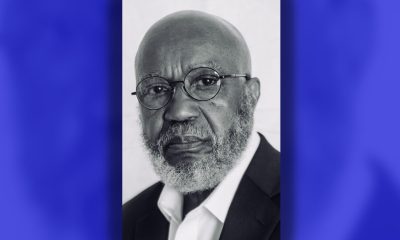#NNPA BlackPress
COMMENTARY: Looking to 2020 — Put Your Vote to WORK!
NNPA NEWSWIRE — Ronald Reagan, who turned his back on organized labor and started America’s middle-class into a tailspin from which it has never recovered, has recently been voted by this administration’s hand-picked NLRB into the Labor Hall of Fame. I think that speaks volumes. Clearly, they have taken a page from the Old Gipper’s playbook. And clearly, it should serve as a dire warning of what is to come should we continue with the status quo.
By Ray Curry, Secretary-Treasurer, UAW
If you work for a living but are somewhat up in the air about who to vote for in 2020 or for that matter, if you should even bother getting to that crowded polling place, I’d like to ask that you indulge me for a minute.
Because I’ve got a story to tell you that might help with your decision. A story of working people and politicians who are working against all of us — everyday.
I’d like to go back to 1980, the year that Ronald Reagan was campaigning to the 40th president of the United States. Much of his rhetoric was designed to appeal to labor and the working men and women of this country, promising to protect jobs, to support policies that would create more jobs and put unemployed Americans back to work.
Promises betrayed
The reality of his presidency and his policies came down somewhat differently.
In fact, President Reagan’s eight years in office were devastating for labor and the middle class. He was a champion of deregulation, which systematically weakened workplace safety standards and record-keeping. He specifically went after labor by appointing three management-friendly National Labor Relations Board (NLRB) members, causing the NLRB to depart from its legal obligation to actively promote collective bargaining — the constitutional right and underlying principle for the existence of unions. During his presidency, NLRB caseloads were drastically cut and the cases that did go forward went from the recent 33 percent finding in favor of employers to 75 percent favoring employers.
His economic policies shifted the tax burden away from the wealthy and onto the back of middle-class Americans.
So, why am I bringing up this sad history here in the last days of 2019?
Because Ronald Reagan, who turned his back on organized labor and started America’s middle-class into a tailspin from which it has never recovered, has recently been voted by this administration’s hand-picked NLRB into the Labor Hall of Fame. I think that speaks volumes. Clearly, they have taken a page from the Old Gipper’s playbook. And clearly, it should serve as a dire warning of what is to come should we continue with the status quo.
Stacked against us
Today, an NLRB even more conservative than President Reagan’s has moved as fast as it could to make it more difficult for unions to organize.
In December of 2017, the board overturned a rule that had made it easier to organize smaller units of workers in big factories and stores.
Another decision made it tougher for workers at fast-food restaurants and other franchised operations to unionize. What’s more, this board is further encroaching on labor by looking to slow unionization elections, a move that, as we all know too well, would give corporations more time to pressure workers to vote NO.
Here at the UAW, we saw those stalling hijinks in action in Chattanooga this summer with the effort to organize Volkswagen and give its workers a real say in their work lives.
This administration hasn’t stopped at turning the NLRB into the Chamber of Commerce. Let’s look at the Supreme Court.
Justice Neil Gorsuch was confirmed in the first few months of this administration and he delivered the conservative anti-labor edge to the Janus case almost as soon as he was installed. Gorsuch, who had close ties with groups that bankrolled Janus, cast the deciding vote in a decision that prohibited public sector unions from collecting fees from non-members.
This devastating decision reversed 41 years of precedent and overturned laws in the 22 states that have not adopted “Right-to-Work” policies. And all signs indicate that, when he is not drinking beer, the administration’s second appointee, Justice Bret Kavanaugh will be just as awful.
The Huffington Post in sizing him up as anti-labor, recounted the time when a New York manufacturer created a new spinoff company to avoid bargaining with unionized workers. Federal regulators and a panel of appellate judges said the manufacturer broke the law and violated its employees’ rights.
There was, however, one judge who dissented in the appeals decision and sided with the employer: Brett Kavanaugh.
Say no more.
Supremely anti-labor
A Legal Aid lawyer put it this way, “Along with [Justice Neil] Gorsuch, [Brett Kavanaugh] is the ideal of a Koch brothers judge. He’ll be anti-labor and anti-worker.”
Of course, just as disturbing when it comes to the courts is this fact: While the Supreme Court gets the attention, it’s the lower courts that decide the bulk of the cases. In lockstep with the anti-worker overhaul of our courts, more pro-management judges have been appointed to the federal appeals courts than at any other time in our recent history, and one out of every four circuit court judges have been installed by the current administration.
And the latest anti-labor move? The nomination and seating of Eugene Scalia as Secretary of Labor, a position that historically enforces workers’ rights and U.S. labor laws. This includes laws meant to protect workers from unsafe workplaces, overtime violations, and employee misclassification. I quite honestly cannot think of anyone less likely to safeguard these protections.
Here is a highlight reel:
Back in 2006, he helped Walmart and other corporations win a lawsuit against the state of Maryland, stopping large companies from having to contribute to their employees’ health care plans or Medicaid. In 2011, he got behind Boeing’s threats to move jobs to a “Right-to-Work” state during union contract negotiations. Additionally, he defended casino boss Steve Wynn in his efforts to force casino card dealers to split their tips with pit bosses.
And here’s one for you: Scalia argued that SeaWorld had no responsibility for the violent death of one of its Orca trainers and instead blamed the victim!
Unsafe at work
And finally, we must consider the current disregard for worker safety. In 2017, 5,197 workers went to work and never returned home to their families. That is an average of 99 workers a week losing their lives while making the rich, richer. And this number can be added to the 2.8 million on the job non-fatal injuries and illnesses reported, with nearly 900,000 of them resulting in lost workdays. Current administration memorandums and executive orders have frozen new regulatory protections since the 2016 election.
Rules requiring employers to keep accurate injury and illness records and to disclose safety, health, and labor violations to qualify for federal contracts have been repealed.
Consider this: There are about 2,100 inspectors to inspect more than 8 million workplaces around the nation. That is roughly one inspector for every 59,000 workers or enough inspectors to inspect workplaces once every 150 years or so.
I ask you, what do we do with this? Is it expecting too much to go to work in the morning and come home safe to your loved ones at the end of the day?
I’ll tell you what we do. WE VOTE!
And we vote for candidates that support the millions of working men and women in this country. Vote to keep our jobs, to keep workers safe, to protect the right to organize and to have a voice in the workplace.
Take this voting season as an opportunity to tell your own story. The story of millions of hard-working Americans that our country so desperately needs to hear.
A story of how we rose up in the face of increasing wage inequality, lack of healthcare, job security and threats to a meaningful retirement; rampant corporate greed and a shrinking middle class.
Labor also faces challenges at the ballot box despite rallying their membership base. Look no further than the Presidential election of 2000 with hanging chads, deleted registered voter rolls in the 2018 Georgia Governor’s race, and the 2018 Florida Governor’s race won by a 50% to 49% margin after a recount. All three races lost by the final vote count and all three were labor endorsed candidates.
Think your vote doesn’t count? Please think again.
#NNPA BlackPress
Beloved Actor and Activist Louis Cameron Gossett Jr. Dies at 87
NNPA NEWSWIRE — Louis Gossett Jr., the groundbreaking actor whose career spanned over five decades and who became the first Black actor to win an Academy Award as Best Supporting Actor for his memorable role in “An Officer and a Gentleman,” has died. Gossett, who was born on May 27, 1936, in Brooklyn, N.Y., was 87. Recognized early on for his resilience and nearly unmatched determination, Gossett arrived in Los Angeles in 1967 after a stint on Broadway.
The post Beloved Actor and Activist Louis Cameron Gossett Jr. Dies at 87 first appeared on BlackPressUSA.

By Stacy M. Brown
NNPA Newswire Senior National Correspondent
@StacyBrownMedia
Louis Gossett Jr., the groundbreaking actor whose career spanned over five decades and who became the first Black actor to win an Academy Award as Best Supporting Actor for his memorable role in “An Officer and a Gentleman,” has died. Gossett, who was born on May 27, 1936, in Brooklyn, N.Y., was 87. Recognized early on for his resilience and nearly unmatched determination, Gossett arrived in Los Angeles in 1967 after a stint on Broadway.
He sometimes spoke of being pulled over by law enforcement en route to Beverly Hills, once being handcuffed to a tree, which he remembered as a jarring introduction to the racial tensions of Hollywood. In his memoir “An Actor and a Gentleman,” Gossett recounted the ordeal, noting the challenges faced by Black artists in the industry. Despite the hurdles, Gossett’s talent shone brightly, earning him acclaim in groundbreaking productions such as “A Raisin in the Sun” alongside Sidney Poitier. His Emmy-winning portrayal of Fiddler in “Roots” solidified his status as a trailblazer, navigating a landscape fraught with racial prejudice.
According to the HistoryMakers, which interviewed him in 2005, Gossett’s journey into the limelight began during his formative years at PS 135 and Mark Twain Junior High School, where he demonstrated early leadership as the student body president. His passion for the arts blossomed when he starred in a “You Can’t Take It With You” production at Abraham Lincoln High School, catching the attention of talent scouts who propelled him onto Broadway’s stage in “Take A Giant Step.” His stellar performance earned him the prestigious Donaldson Award for Best Newcomer to Theatre in 1952. Though initially drawn to sports, Gossett’s towering 6’4” frame and athletic prowess led him to receive a basketball scholarship at New York University. Despite being drafted by the New York Knicks in 1958, Gossett pursued his love for acting, honing his craft at The Actors Studio under the tutelage of luminaries like John Sticks and Peggy Fury.
In 1961, Gossett’s talent caught the eye of Broadway directors, leading to roles in acclaimed productions such as “Raisin in the Sun” and “The Blacks,” alongside legends like James Earl Jones, Cicely Tyson, Roscoe Lee Brown, and Maya Angelou. Transitioning seamlessly to television, Gossett graced small screens with appearances in notable shows like “The Bush Baby” and “Companions in Nightmare.” Gossett’s silver screen breakthrough came with his role in “The Landlord,” paving the way for a prolific filmography that spanned over 50 movies and hundreds of television shows. From “Skin Game” to “Lackawanna Blues,” Gossett captivated audiences with his commanding presence and versatile performances.
However, his portrayal of “Fiddler” in Alex Haley’s groundbreaking miniseries “Roots” earned Gossett critical acclaim, including an Emmy Award. The HistoryMakers noted that his golden touch extended to the big screen, where his role as Sergeant Emil Foley in “An Officer and a Gentleman” earned him an Academy Award for Best Supporting Actor, making him a trailblazer in Hollywood history.
Beyond the glitz and glamour of Hollywood, Gossett was deeply committed to community activism. In 1964, he co-founded a theater group for troubled youth alongside James Earl Jones and Paul Sorvino, setting the stage for his lifelong dedication to mentoring and inspiring the next generation. Gossett’s tireless advocacy for racial equality culminated in the establishment of Eracism, a nonprofit organization dedicated to combating racism both domestically and abroad. Throughout his illustrious career, Gossett remained a beacon of strength and resilience, using his platform to uplift marginalized voices and champion social change. Gossett is survived by his children, Satie and Sharron.
The post Beloved Actor and Activist Louis Cameron Gossett Jr. Dies at 87 first appeared on BlackPressUSA.
#NNPA BlackPress
COMMENTARY: D.C. Crime Bill Fails to Address Root Causes of Violence and Incarceration
WASHINGTON INFORMER — The D.C. crime bill and so many others like it are reminiscent of the ‘94 crime bill, which produced new and harsher criminal sentences, helped deploy thousands of police and surveilling methods in Black and brown communities, and incentivized more states to build prisons through a massive infusion of federal funding. While it is not at the root of mass incarceration, it significantly accelerated it, forcing a generation of Black and brown families into a never-ending cycle of state-sanctioned violence and incarceration.
The post COMMENTARY: D.C. Crime Bill Fails to Address Root Causes of Violence and Incarceration first appeared on BlackPressUSA.

By Kaili Moss and Jillian Burford | Washington Informer
Mayor Bowser has signed the “Secure DC” omnibus bill passed by the D.C. Council last month. But we already know that this bill will be disastrous for all of D.C., especially for Black and brown residents.
While proponents claim that this legislation “will make D.C. residents safer and more secure,” it actually does nothing to address the root of the harm in the first place and instead maintains a cycle of violence, poverty, and broken community ties. The omnibus bill calls for increased surveillance, drug-free zones, and will expand pre-trial detention that will incarcerate people at a significantly higher rate and for an indeterminate amount of time before they are even tried. This bill will roll back decades of nationwide policy reform efforts and initiatives to keep our communities safe and whole, which is completely contradictory to what the “Secure” D.C. bill claims it will do.
What is unfolding in Washington, D.C., is part of a dangerous national trend. We have seen a resurrection of bad crime bills in several jurisdictions across the country — a phenomenon policy experts have named “zombie laws,” which are ineffective, costly, dangerous for communities of color and, most importantly, will not create public safety. Throwing more money into policing while failing to fund preventative measures does not keep us safe.
The D.C. crime bill and so many others like it are reminiscent of the ‘94 crime bill, which produced new and harsher criminal sentences, helped deploy thousands of police and surveilling methods in Black and brown communities, and incentivized more states to build prisons through a massive infusion of federal funding. While it is not at the root of mass incarceration, it significantly accelerated it, forcing a generation of Black and brown families into a never-ending cycle of state-sanctioned violence and incarceration. Thirty years later, despite spending billions each year to enforce these policies with many of these provisions remaining in effect, it has done very little to create long-term preventative solutions. Instead, it placed a permanent moving target on the backs of Black people, and the D.C. crime bill will do the same.
The bill calls for more pretrial detention. When our loved ones are held on pretrial detention, they are held on the presumption of guilt for an indeterminate amount of time before ever seeing a judge, which can destabilize people and their families. According to experts at the Malcolm Weimer Center for Social Policy at Harvard University, just one day in jail can have “devastating consequences.” On any given day, approximately 750,000 people are held in jails across the nation — a number that beats our nation’s capital population by about 100,000. Once detained, people run the risk of losing wages, jobs, housing, mental and health treatments, and time with their families. Studies show that pretrial detention of even a couple of days makes it more likely for that person to be rearrested.
The bill also endangers people by continuing a misguided and dangerous War on Drugs, which will not get drugs off the street, nor will it deter drug use and subsequent substance use disorders (SUDs). Drug policies are a matter of public health and should be treated as such. Many states such as Alabama, Iowa and Wisconsin are treating the current fentanyl crisis as “Crack 2.0,” reintroducing a litany of failed policies that have sent millions to jails and prisons instead of prioritizing harm reduction. Instead, we propose a simple solution: listen to members of the affected communities. Through the Decrim Poverty D.C. Coalition, community members, policy experts and other stakeholders formed a campaign to decriminalize drugs and propose comprehensive legislation to do so.
While there are many concerning provisions within the omnibus bill, car chases pose a direct physical threat to our community members. In July 2023, NBC4 reported that the D.C. Council approved emergency legislation that gave MPD officers the ability to engage in vehicular pursuits with so-called “limited circumstances.” Sgt. Val Barnes, the head of MPD’s carjacking task force, even expressed concern months before the decision, saying, “The department has a pretty strict no-chase policy, and obviously for an urban setting and a major metropolitan city, that’s understandable.” If our law enforcement officers themselves are operating with more concern than our elected officials, what does it say about the omnibus bill’s purported intention to keep us safe?
And what does it mean when the risk of bodily harm is posed by the pursuit itself? On Saturday, Feb. 10, an Eckington resident had a near-miss as a stolen car barreled towards her and her dog on the sidewalk with an MPD officer in pursuit. What responsibility does the city hold if this bystander was hit? What does restitution look like? Why are our elected officials pushing for MPD officers to contradict their own policies?
Just a few summers ago during the uprisings of 2020, we saw a shift in public perspectives on policing and led to legislation aimed at limiting police power after the highly-publicized murders of loved ones Breonna Taylor and George Floyd — both victims of War on Drugs policing and the powers gained from the ’94 crime bill. And yet here we are. These measures do not keep us safe and further endanger the health of our communities. Studies show that communities that focus on harm reduction and improving material conditions have a greater impact on public safety and community health. What’s missing in mainstream conversations about violent crime is the violence that stems from state institutions and structures that perpetuate racial and class inequality. The people of D.C. deserve to feel safe, and that includes feeling safe from the harms enacted by the police.
Kaili Moss is a staff attorney at Advancement Project, a national racial justice and legal organization, and Jillian Burford is a policy organizer at Harriet’s Wildest Dreams.
The post COMMENTARY: D.C. Crime Bill Fails to Address Root Causes of Violence and Incarceration first appeared on BlackPressUSA.
#NNPA BlackPress
Mayor, City Council President React to May 31 Closing of Birmingham-Southern College
THE BIRMINGHAM TIMES — “This is a tragic day for the college, our students, our employees, and our alumni, and an outcome so many have worked tirelessly to prevent,” Rev. Keith Thompson, chairman of the BSC Board of Trustees said in an announcement to alumni. “We understand the devastating impact this has on each of you, and we will now direct our efforts toward ensuring the smoothest possible transition for everyone involved.”
The post Mayor, City Council President React to May 31 Closing of Birmingham-Southern College first appeared on BlackPressUSA.

By Barnett Wright | The Birmingham Times
Birmingham-Southern College will close on May 31, after more than a century as one of the city’s most respected institutions.
“This is a tragic day for the college, our students, our employees, and our alumni, and an outcome so many have worked tirelessly to prevent,” Rev. Keith Thompson, chairman of the BSC Board of Trustees said in an announcement to alumni. “We understand the devastating impact this has on each of you, and we will now direct our efforts toward ensuring the smoothest possible transition for everyone involved.”
There are approximately 700 students enrolled at BSC this semester.
“Word of the decision to close Birmingham Southern College is disappointing and heartbreaking to all of us who recognize it as a stalwart of our community,” Birmingham Mayor Randall Woodfin said in a statement. “I’ve stood alongside members of our City Council to protect this institution and its proud legacy of shaping leaders. It’s frustrating that those values were not shared by lawmakers in Montgomery.”
Birmingham City Council President Darrell O’Quinn said news of the closing was “devastating” on multiple levels.
“This is devastating for the students, faculty members, families and everyone affiliated with this historic institution of higher learning,” he said. “It’s also profoundly distressing for the surrounding community, who will now be living in close proximity to an empty college campus. As we’ve seen with other institutions that have shuttered their doors, we will be entering a difficult chapter following this unfortunate development … We’re approaching this with resilience and a sense of hope that something positive can eventually come from this troubling chapter.”
The school first started as the merger of Southern University and Birmingham College in 1918.
The announcement comes over a year after BSC officials admitted the institution was $38 million in debt. Looking to the Alabama Legislature for help, BSC did not receive any assistance.
This past legislative session, Sen. Jabo Waggoner sponsored a bill to extend a loan to BSC. However, the bill subsequently died on the floor.
Notable BSC alumni include former New York Times editor-in-chief Howell Raines, former U.S. Sen. Howell Heflin and former Alabama Supreme Court Chief Justice Perry O. Hooper Sr.
This story will be updated.
The post Mayor, City Council President React to May 31 Closing of Birmingham-Southern College first appeared on BlackPressUSA.
-

 Activism4 weeks ago
Activism4 weeks agoOakland Post: Week of March 20 – 26, 2024
-

 #NNPA BlackPress3 weeks ago
#NNPA BlackPress3 weeks agoCOMMENTARY: D.C. Crime Bill Fails to Address Root Causes of Violence and Incarceration
-

 #NNPA BlackPress3 weeks ago
#NNPA BlackPress3 weeks agoMayor, City Council President React to May 31 Closing of Birmingham-Southern College
-

 #NNPA BlackPress3 weeks ago
#NNPA BlackPress3 weeks agoFrom Raids to Revelations: The Dark Turn in Sean ‘Diddy’ Combs’ Saga
-

 #NNPA BlackPress4 weeks ago
#NNPA BlackPress4 weeks agoCOMMENTARY: Lady Day and The Lights!
-

 Activism3 weeks ago
Activism3 weeks agoOakland Post: Week of March 27 – April 2, 2024
-

 #NNPA BlackPress4 weeks ago
#NNPA BlackPress4 weeks agoBaltimore Key Bridge Catastrophe: A City’s Heartbreak and a Nation’s Alarm
-

 #NNPA BlackPress4 weeks ago
#NNPA BlackPress4 weeks agoBaltimore’s Key Bridge Struck by Ship, Collapses into Water





















































